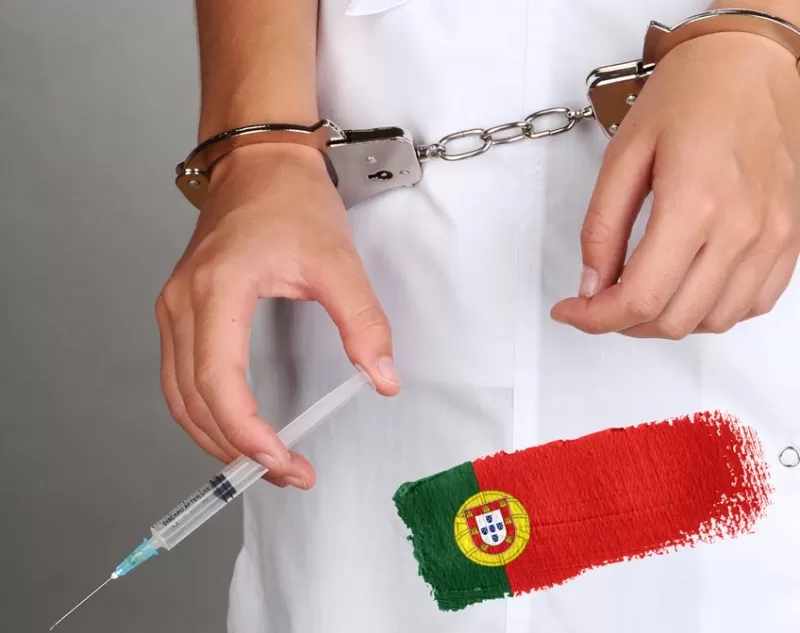In his childhood near Lisbon’s Casal Ventoso neighborhood, photographer Gonçalo Fonseca witnessed the rampant drug trade, with 5,000 addicts wandering the streets during the 1990s. Portugal faced a heroin addiction crisis, with 1% of the population hooked, and HIV infections were soaring. The government’s response involved harsh policies and a focus on criminalization, similar to the U.S. approach, but it proved ineffective. As Casal Ventoso faced demolition in 2001, Américo Nave from the outreach NGO Crescer worked with the afflicted, witnessing horrifying conditions.
In a groundbreaking move, Portugal took a radical step in 2001 by becoming the first country to decriminalize all drug consumption. Instead of criminal punishment, drug users received support and medical care. This shift significantly departed from conventional approaches and became a potential model for other nations grappling with drug-related issues.
The War on Drugs
Over the past seventeen years, the U.S. has been grappling with its worst addiction epidemic in history, with opioid overdoses causing an estimated 64,000 deaths in 2016 alone—exceeding the combined toll of American deaths in major wars. In contrast, Portugal’s drug-induced death rate has significantly dropped, standing at one-fiftieth of the U.S. rate, with reduced HIV infection cases and declining drug use among vulnerable populations.
In 2017, photographer Gonçalo Fonseca observed Lisbon’s drug outreach efforts and noticed the stark contrast in approach between the U.S. and Portugal. He acknowledged the different contexts of both countries but believed there were lessons to be learned from treating drug addiction as a medical issue rather than a criminal one.
Portugal’s drug crisis escalated rapidly after the country’s shift to democracy in 1974, as soldiers returning from ex-colonies brought various drugs. A lack of preparedness and knowledge about drug risks led to a crisis affecting all social classes. In 1998, João Goulão and experts recommended a change in approach, treating drug addicts as patients needing help rather than criminals. This allowed the police to focus on traffickers while the government invested in treatment and harm reduction practices. Consequently, the social cost of drug misuse decreased, and the percentage of people in prison for drug law violations significantly reduced.
Portugal’s success in decriminalization and prioritizing treatment offers valuable insights for other countries facing drug-related challenges, despite the unique complexities of each nation’s situation.
Almost Two Decades Later
Portugal’s Crescer outreach team has been walking the same route in a Lisbon suburb since 2001, providing heroin and cocaine addicts with clean needles, tin foil, and psychological support. Approximately 1,600 users receive help from the team annually, helping them with safer consumption practices and offering a chance for recovery.
The Portuguese Harm Reduction Policy, led by young nurse Joana Frias, is vital in reaching out to drug users and ensuring they receive the help they need. Instead of judgment, the team offers assistance and support, allowing users to decide when to seek treatment.
Under Portugal’s 2001 law, drug dealers still face imprisonment. Still, individuals caught with small drug quantities, even marijuana, and heroin, are directed to local commissions by doctors, lawyers, and social workers. These commissions educate them about treatment options and available medical services. The country does not differentiate between “hard” and “soft” drugs or whether drug consumption occurs privately or publicly; the focus is on the user’s overall relationship with drugs and their well-being.
Apart from outreach programs, the panel led by João Goulão proposed supervised drug consumption facilities. These facilities have proven successful in various European countries and Canada, saving lives, reducing public disorders associated with drugs, and curbing the spread of HIV and Hepatitis C. However, implementing such facilities remains contentious in Portugal and the United States.
Portugal’s approach to drug addiction involves decriminalization and prioritizing health-oriented solutions, allowing people to seek treatment more readily without fear of criminal repercussions. Between 1998 and 2011, the number of people in drug treatment increased by over 60%, and a significant proportion received opioid substitution therapy.
Portugal’s focus on treating drug addicts with dignity and empathy has had a profound impact. By investing in treatment and harm reduction practices, the country has reduced the social cost of drug misuse and decreased the incarceration rate for drug-related offenses. Providing opioid-substitution therapy has been a crucial part of the strategy, significantly increasing people seeking help for their addiction. Portugal’s success in this area provides valuable lessons for other countries struggling with addiction epidemics.
Critics argue that Portugal’s drug culture has become too permissive, pointing to increased drug experimentation since 2001. However, the policies have endured through conservative and progressive administrations due to widespread public support for decriminalization and a focus on health-centered solutions.
Some experts claim that Portugal’s success has been exaggerated, as lenient enforcement of anti-drug laws existed even before the 2001 legislation. Nonetheless, on the ground in Portugal, healthcare workers are better equipped to assist addicts, and despite austerity measures, outreach teams continue to provide support.
Portugal still faces challenges, with some individuals using drugs in dire conditions. Nevertheless, the lesson to be learned from Portugal’s approach is to treat drug users with dignity, providing them with the tools to rebuild their lives without excessive spending. Such a shift in perspective requires an end to treating drug users as criminals, allowing them to seek help and recovery without fear of judgment or punishment.
Conclusion
Portugal’s trailblazing decision to decriminalize drug consumption, particularly synthetic drugs, has transformed the country’s approach to drug addiction. By treating drug users as patients needing help rather than criminals, Portugal has significantly reduced drug-induced deaths and HIV infections while providing a platform for addicts to seek treatment voluntarily.
The success of this revolutionary policy lies in its emphasis on harm reduction, compassionate treatment, and support for individuals struggling with addiction. While challenges and controversies persist, Portugal’s experience offers valuable insights and inspiration for other countries seeking solutions to their drug epidemics. Ultimately, the lessons learned from Portugal’s groundbreaking approach could pave the way for a more humane and effective global strategy in the War on Drugs. (Full Story)

